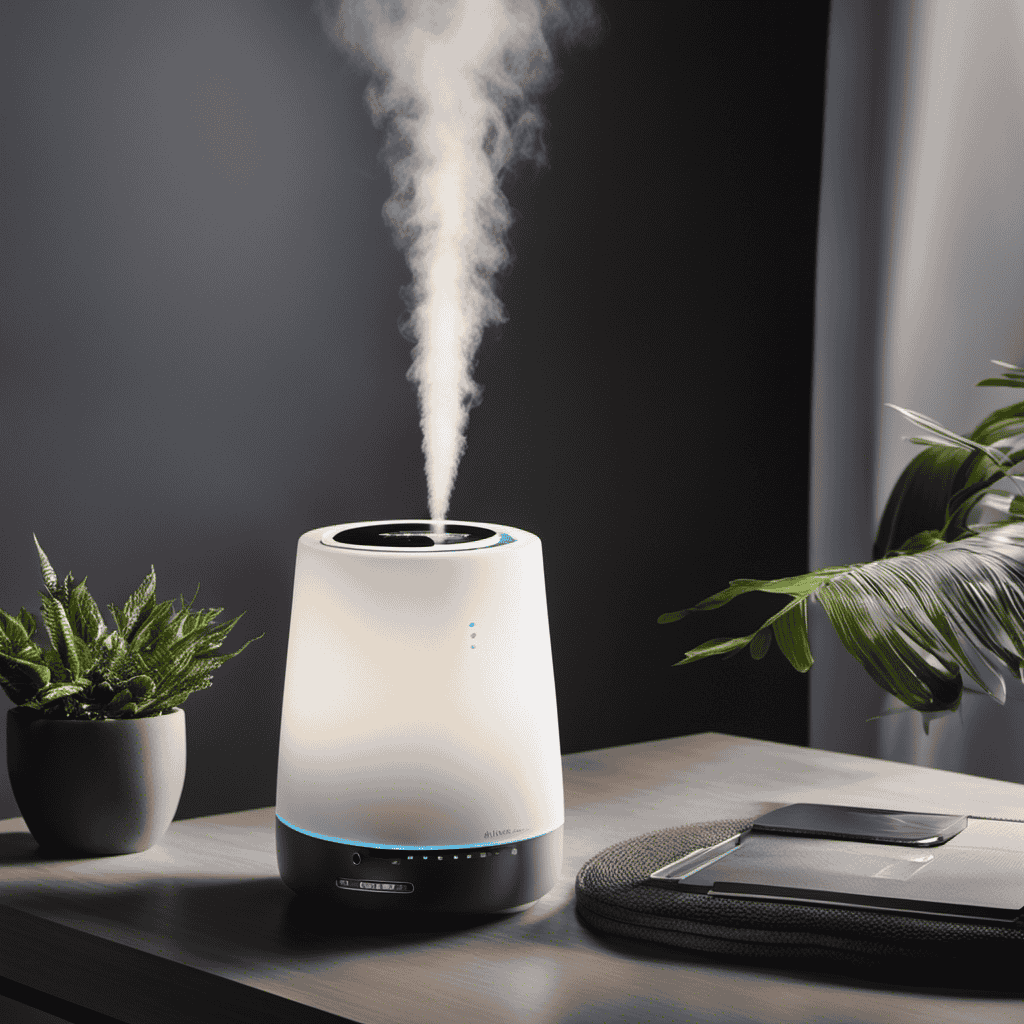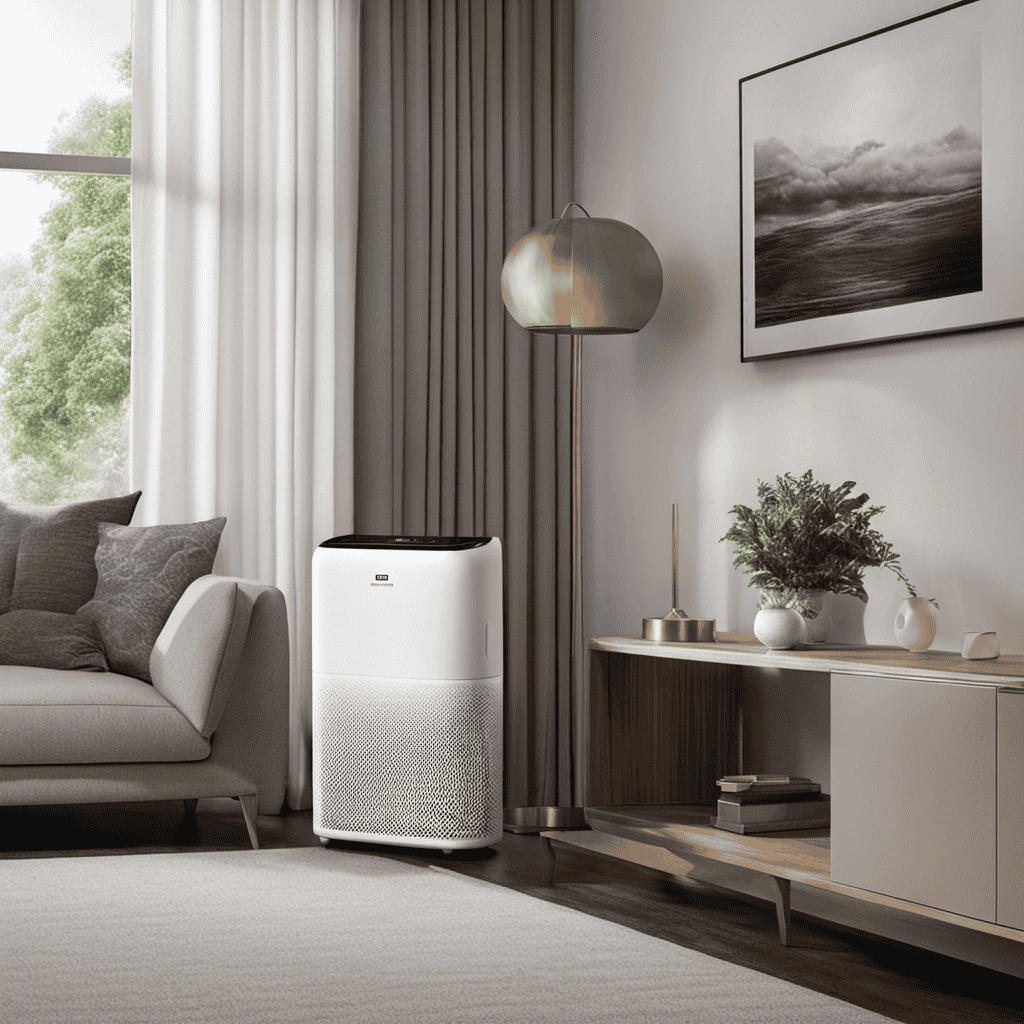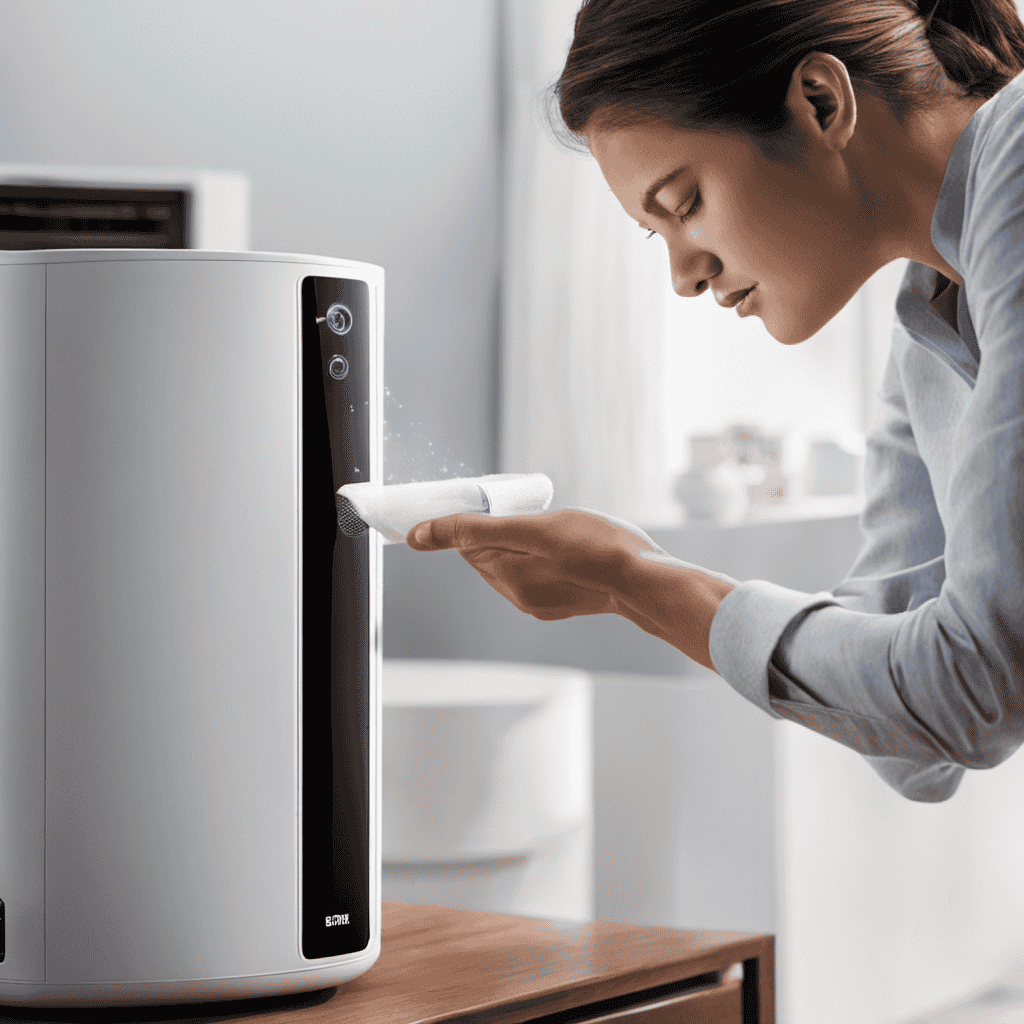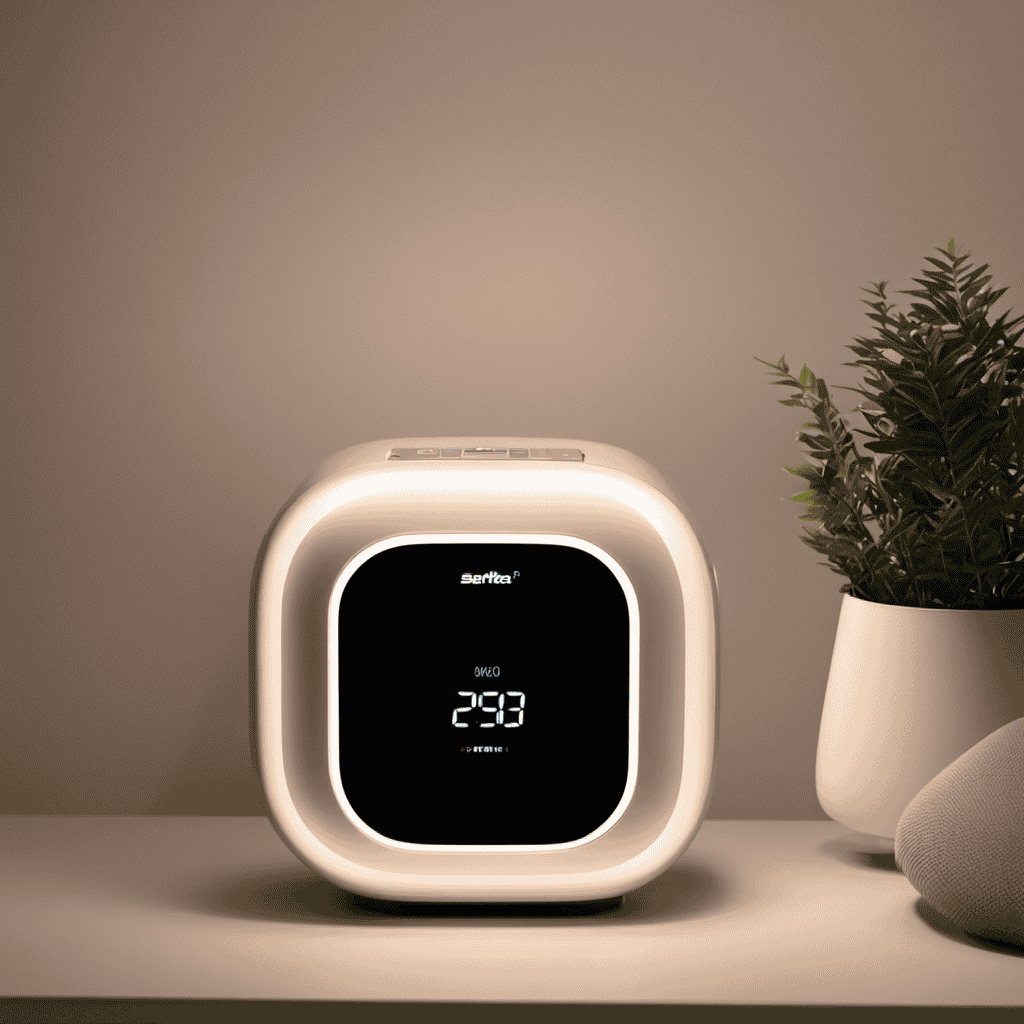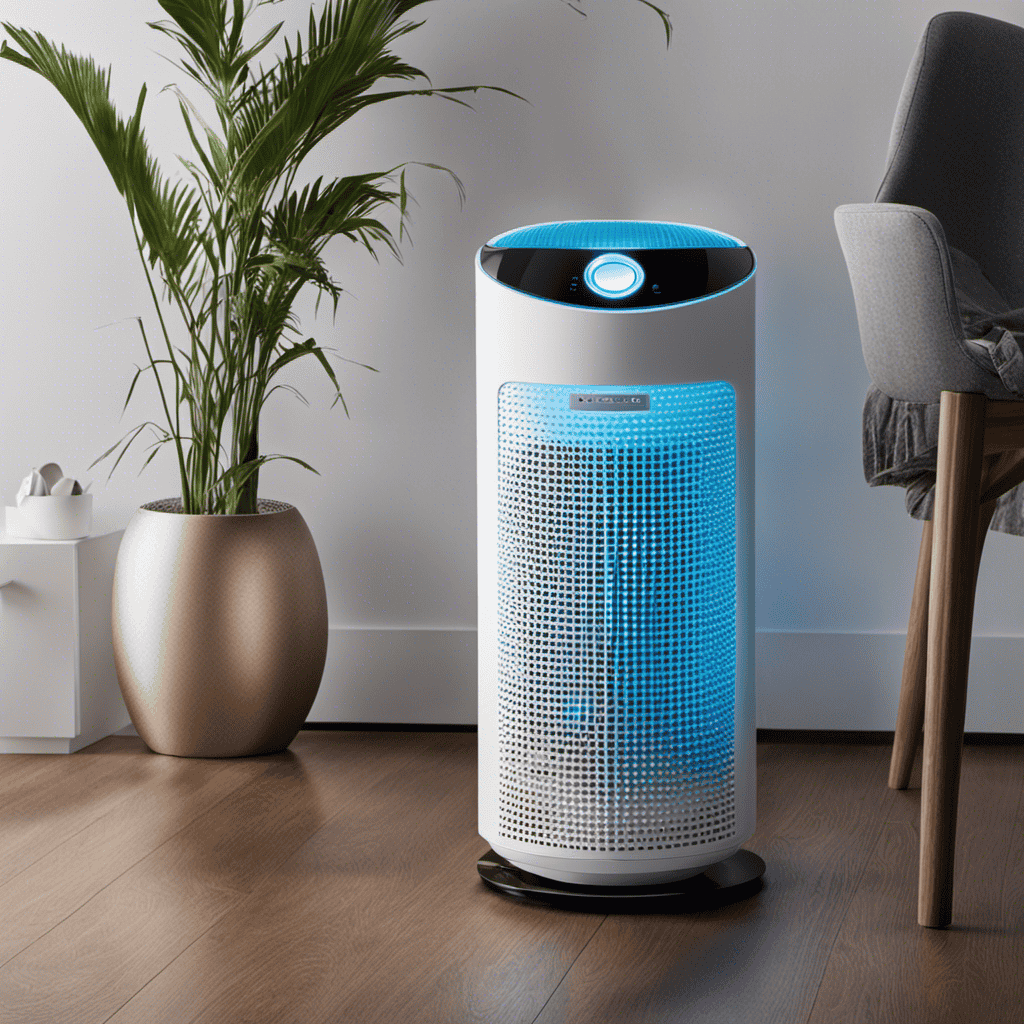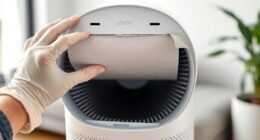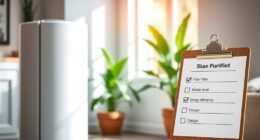As I explore the realm of indoor air quality, I am contemplating the distinction between an air humidifier and an air purifier. Although these two gadgets are frequently mixed up, they each have unique roles in promoting a healthier living space.
Through this article, I aim to unravel the mysteries surrounding these devices and shed light on their unique features, functions, and benefits.
Join me on this enlightening journey as we explore the depths of air quality and unveil the true essence of air humidifiers and air purifiers.
Key Takeaways
- Air humidifiers increase moisture in the air to alleviate dry skin, allergies, and respiratory conditions.
- Air purifiers remove pollutants, allergens, and other airborne particles from the air.
- Air purifiers improve overall air quality and reduce the risk of respiratory issues.
- Excessive humidity from air humidifiers can promote the growth of mold, bacteria, and dust mites, leading to health problems.
Types of Air Humidifiers and Air Purifiers
There are two main types of air humidifiers and air purifiers that you should know about.
Air humidifiers are devices that increase the moisture content in the air, while air purifiers are designed to remove pollutants and improve indoor air quality.
When it comes to air humidifiers, the two main types are evaporative and ultrasonic humidifiers. Evaporative humidifiers work by blowing air over a wet wick or filter, causing water to evaporate and increase humidity.
On the other hand, ultrasonic humidifiers use high-frequency vibrations to create a fine mist of water particles.
When it comes to air purifiers, there are several types of air filters that can be used, such as HEPA filters, activated carbon filters, and ionizers.
The benefits of air purifiers include removing allergens, dust, and pollutants from the air, which can help improve respiratory health and reduce allergy symptoms.
Purpose and Function of Air Humidifiers and Air Purifiers
Air humidifiers and air purifiers serve different purposes and function differently.
Air humidifiers are designed to add moisture to the air, increasing the humidity level in a room or space. This can be beneficial in dry climates or during winter months when indoor heating systems can cause the air to become dry. By increasing humidity, air humidifiers can help alleviate symptoms associated with dry skin, allergies, and respiratory conditions.
On the other hand, air purifiers are designed to remove pollutants, allergens, and other airborne particles from the air. They work by using filters or other technologies to trap and eliminate these contaminants, improving overall air quality. This can be particularly advantageous for individuals with allergies or asthma, as well as those living in areas with high levels of pollution.
Key Features and Technology in Air Humidifiers and Air Purifiers
To choose the right air humidifier or air purifier for your needs, you should consider the key features and technologies available in these devices. Here are three important factors to keep in mind:
-
Maintenance requirements: Air humidifiers typically require regular cleaning and refilling of the water tank to prevent the growth of bacteria and mold. On the other hand, air purifiers usually have replaceable filters that need to be changed periodically to maintain their efficiency.
-
Impact on respiratory health: Both air humidifiers and air purifiers play a crucial role in improving air quality and promoting respiratory health. Air purifiers remove allergens, pollutants, and other harmful particles from the air, reducing the risk of respiratory issues. Air humidifiers add moisture to the air, which can help alleviate symptoms of dryness, congestion, and allergies.
Understanding these key features and technologies will help you make an informed decision when choosing between an air humidifier and an air purifier. Remember to consider your specific needs and the requirements of your living space.
Benefits and Health Effects of Air Humidifiers and Air Purifiers
If you’re considering an air purifier or humidifier, it’s important to understand the benefits and potential health effects they can have.
Air purifiers are designed to remove pollutants and allergens from the air, improving indoor air quality. They can help reduce the symptoms of allergies, asthma, and respiratory conditions. Air purifiers can also remove unpleasant odors and harmful chemicals, creating a healthier and more comfortable living environment.
On the other hand, air humidifiers increase the moisture in the air, which can be beneficial for those suffering from dry skin, allergies, or respiratory issues. However, excessive humidity can promote the growth of mold, bacteria, and dust mites, leading to health problems like allergies and respiratory infections.
It’s essential to maintain proper humidity levels to reap the benefits without experiencing any negative health effects.
Factors to Consider When Choosing Between an Air Humidifier and Air Purifier
When choosing between an air humidifier and purifier, it’s important to consider factors like your specific needs and the potential health effects. Here are some factors to consider and the maintenance requirements for each:
-
Purpose: Determine whether you need to add moisture to the air or remove pollutants.
-
Allergies: If you suffer from allergies, an air purifier may be more beneficial as it can remove allergens from the air.
-
Size of the space: Consider the square footage of the area you want to treat, as different models have different coverage capacities.
Maintenance requirements also vary between the two. Air humidifiers need regular cleaning to prevent the growth of mold and bacteria in the water tank, while air purifiers typically require filter replacements to maintain their efficiency. It’s important to factor in these maintenance requirements when making your decision.
Frequently Asked Questions
Can an Air Humidifier Also Function as an Air Purifier?
Yes, an air humidifier can also function as an air purifier. While its primary purpose is to add moisture to the air, some models also have filters that can remove impurities like dust, allergens, and pet dander.
Are There Any Maintenance Requirements for Air Purifiers?
Air purifiers require regular maintenance to ensure optimal performance. Cleaning or replacing filters, emptying and cleaning the collection tray, and checking for any malfunctions are all important tasks. However, the benefits of air purifiers far outweigh the maintenance requirements.
Can Air Purifiers Remove Pet Dander From the Air?
Yes, air purifiers can remove pet dander from the air. They use filters to trap and remove allergens, including pet dander, which can help alleviate symptoms of asthma and reduce exposure to dust mites.
How Often Should I Clean My Air Humidifier?
Cleaning my air humidifier regularly is important for optimal performance and to prevent the buildup of bacteria and mold. Regular maintenance ensures that it continues to provide the benefits of proper humidity levels and improved air quality in my home.
Can Air Purifiers Help With Allergies?
Air purifiers can be beneficial for those with nasal allergies and asthma. They help remove allergens such as dust, pollen, and pet dander from the air, reducing symptoms and improving air quality.
Conclusion
In conclusion, after carefully examining the differences between air humidifiers and air purifiers, it is clear that both devices serve distinct purposes in improving indoor air quality.
While air humidifiers add moisture to the air, alleviating dryness and soothing respiratory symptoms, air purifiers actively remove pollutants and allergens, ensuring clean and fresh air.
With advanced technology and various features, these devices offer a range of benefits and can significantly impact our health.
So, whether you’re seeking a gentle mist or a powerful filtration system, there’s no denying the transformative effects these machines have on our environment.
